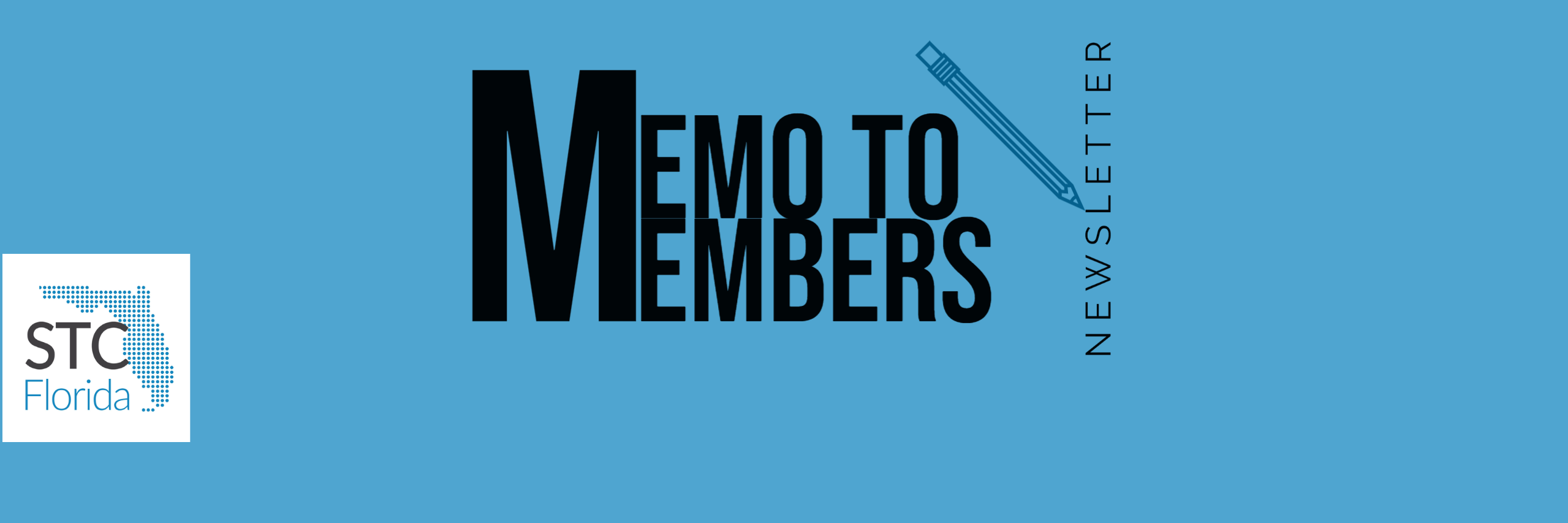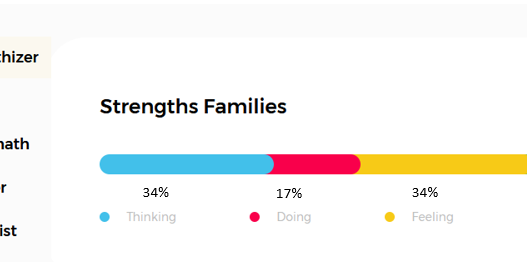By Julia Southwick and Joy Carandang
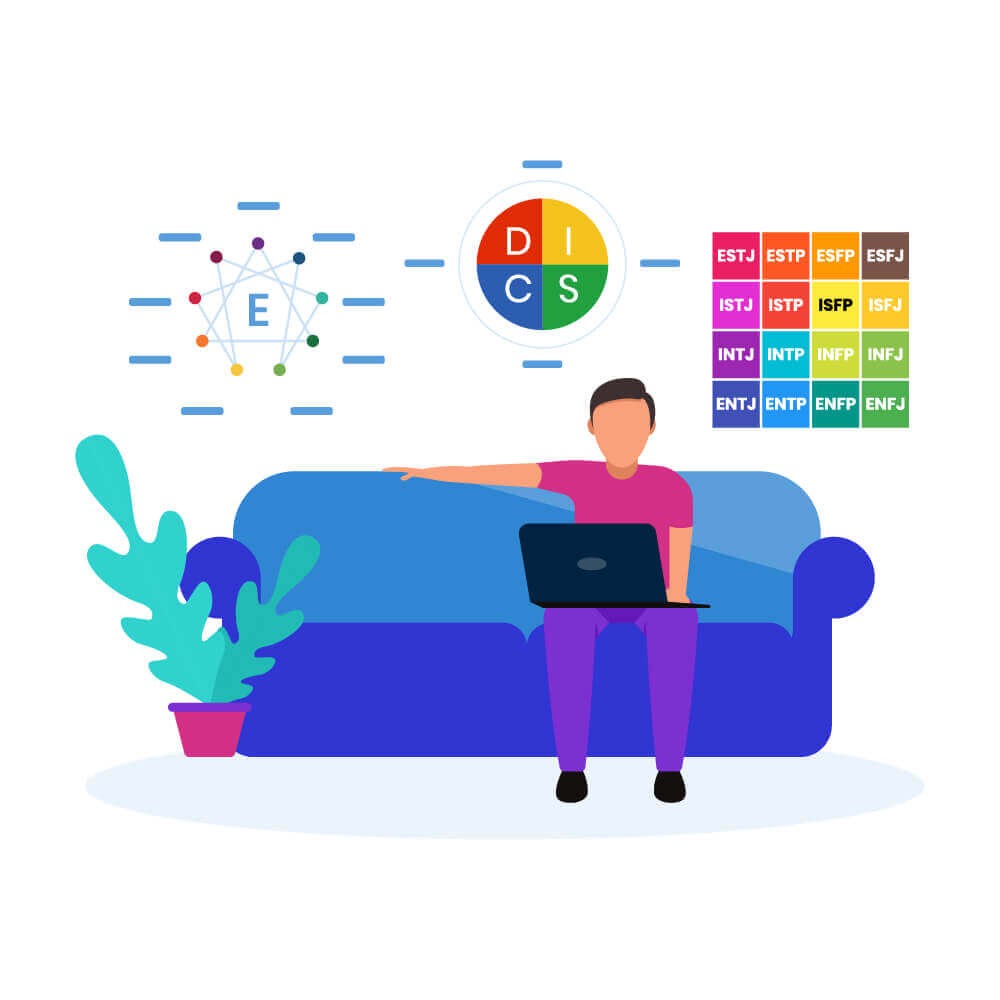
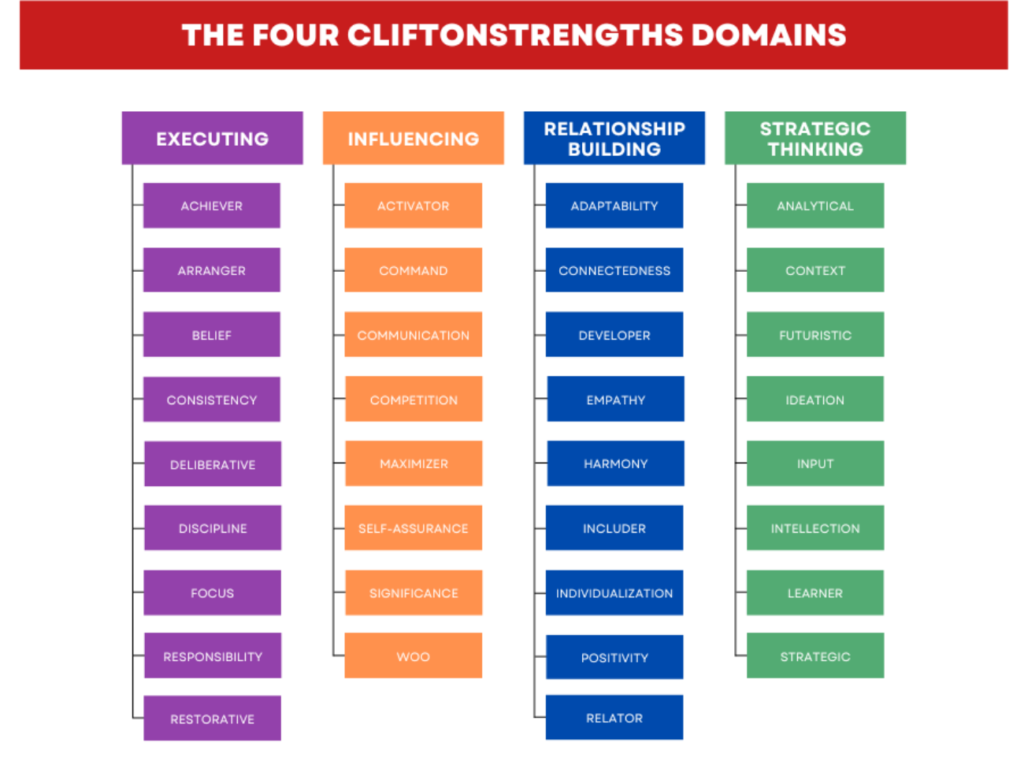
History of the Gallup Test
Following his tour in WWII as a navigator and bombardier, Donald O. Clifton felt a calling towards fostering humility while continuing to serve others. As he attended the University of Nebraska-Lincoln on the prestigious Regents Scholarship, he had become fascinated with the intricacies of human development. He developed the Clifton StrengthsFinder assessment which measures a student’s aptitude. This assessment has had other names as well, including the CliftonStrengths assessment and its common name the Gallup Test. Together, The Gallup Organization, a global management consulting company, worked alongside Clifton to form the CliftonStrengths assessment in the 1990s. In recent decades, the CliftonStrengths assessment is utilized in the workplace to improve team engagement, collaboration, and dynamics. Understanding one’s strengths will not only empower new generations of future leaders but help people from all walks of life work towards becoming the best versions of themselves.
Many Fortune 500 companies attribute the CliftonStrengths assessment to their workplace inclusion and success, including:
Southwest Airlines
Estée Lauder
Ameritas
There are over 34 results, or themes of this personality test which can be divided into the following four categories:
Strategic Thinking, Relationship Building, Influencing, and Executing
The assessment should take 30 minutes of your time. We suggest taking the test when you are in a neutral state, free of as much distraction as possible to receive the most accurate results. Once you have completed the assessment, you will be given a report that will highlight your top five strengths.
Further Reading:
How Do CliftonStrengths and MBTI® (Myers-Briggs®) Compare?
Julia: Empathizer, Coach, Philomath, Thinker, Optimist

Thinking and feeling are tied for my top strengths families which makes sense given my other personality type results. To break my results down, I’m going to group them into three sections. I’ll start each of these sections with my understanding of the results and then end them with bringing in my results from other personality tests. To start, Empathizers are based in kindness. They have a natural ability to step into another person’s shoes, understand what others are going through, appreciate everyone’s differences, treat people fairly without excluding anyone, and mitigate conflict. Similarly, Optimists are also good at mitigating conflicts because of some of the most commonly known traits of them. These traits are being full of positivity and enthusiasm leading to them seeing the bright side of every situation which is key to motivating people and resolving conflicts. My being both an optimist and empathizer relates to being an enneagram type 2 with high 7 results, a true colors Blue, and the conscientious part of my DiSC results.
The goal of the Coach is to help people realize and develop their potential and success as there is always room for growth through learning, discussions, and creating environments that facilitate progress. I see this part of my results as the bridge between my more emotional side/results and my more logical side/results. It is the perfect blend of all of my previous personality types, pulling equally from all of them.
Philomaths are deeply curious and want to learn new things though not necessarily become SMEs as the process of learning is the reward itself. They also like to learn in different styles to see how quickly they can learn new things to share with others. On the other hand, Thinkers enjoy stretching their “brain muscles” in deep thought, meaningful conversations, introspections, and mental activities. This allows them to simplify sophisticated concepts in a meaningful way. Both my results as a philomath and thinker allows me to learn deeply about many topics and pulls from my ADHD and my personality types (T from MBTI, my enneagram 1 wing, and S from DiCS). The philomath side also pulls a little from my strong 7 enneagram result in that it describes an ADHD desire to know more about everything that catches my interest.
Overall, I’m excited to see how much more developed I can become as an empathizer, coach, philomath, thinker, and optimist as well as where they’ll take me.
Joy: Empathizer, Philomath, Believer, Optimist, Catalyst
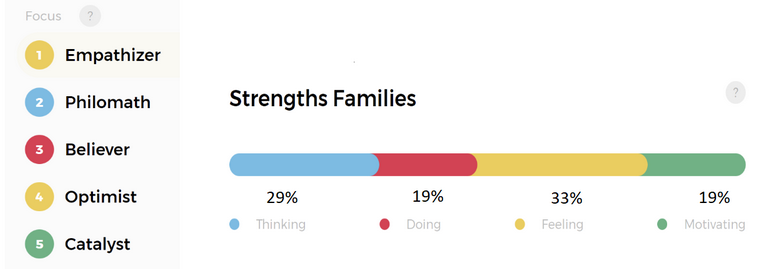
My top five focuses of the CliftonStrengths test are Empathizer, Philomath, Believer, Optimist, and Catalyst. Overall, I was surprised at how aligned my results were with previous personality tests we have taken. For example, INFPs (Myers-Briggs test) are known for having an empathetic communication style that values unity and harmony in the workplace—particularly, when working in teams. I am likely to check in with my colleagues to see where each of us is amidst the cornerstones of our projects. In turn, I also enjoy collaborating in such settings where everyone’s views can be actively heard and fully considered.
For as long as I can remember, I’ve had a passion for learning and being open to differing ideas and ways of knowing (Philomath). Specifically, my current academic interests lie in Intercultural Technical Communication, and while taking Technical Communication Theory and Practice during my first semester at UCF, I was thrilled to learn about how interdisciplinary Technical Communication is–especially when it comes to cross-cultural communication. Soon, I hope to continue my graduate school journey by conducting further research in the latter and possibly UX/UI design. What I love about Technical Communication is the ever-evolving topics and branches of it. While the future remains uncertain in our field, therein lies a plethora of discoveries and innovations that I am thrilled to learn more about in the coming years.
My third focus is Believer, which ties well into my fourth focus as an Optimist. Since I tend to gravitate to causes that I am passionate about, when doing so I feel the most energized and focused on my work. Alternatively, I am apt to recognize the positives in each situation and think of ways to improve each project at hand. Over the past year, I’ve had the honor to volunteer at the Future Technical Communicators (FTC) club at UCF, which has led me to countless opportunities for professional and personal growth such as presenting at the Spark STEM Fest this past February as well as my mentorship with Julia through the annual program between FTC and STC Florida. I am extremely appreciative of being able to participate in such supportive environments with individuals who are welcoming and passionate about what they do.
Lastly, my final focus is Catalyst. I’ve come to recognize that I am a person who enjoys initiating projects, as well as planning out roles as a team. Utilizing team agendas greatly helps me stick to specific dates and tasks. I find that when everyone in a group freely chooses what they are interested in within their schedules, we can produce work that is efficient and meaningful. As a whole, I am most fulfilled when working in such organized and dynamic settings.
…But What Does This Have To Do With Tech Comm?
A career in Technical Communication can translate into working in a number of ever-changing industries and fields for various causes that operate within different workflows. Taking the Five Factor Personality test can help a budding technical writer, a current technical writer, or an established practitioner who is looking to find themselves in a new industry identify their values and needs within the job market. Additionally, understanding your results can be beneficial in evaluating your modes of productivity and interpersonal skills.
Those interpersonal relationships drive our success on the job. Learning about our Five Factor Personality type provides a useful language for technical communicators to understand how we interact with others and how we want them to interact with us.
Knowledge about your Five Factor Personality type and others’ Five Factor Personality type can be used to connect with teammates, SMEs, and others in our companies and profession. This can provide the tools we need to convince others why tech writers are needed and why some decisions need to be made for our documentation.
We Want to Hear from You
No test will ever present a complete portrait of who you are, but many people find them useful for self-reflection or as tools to engage with others. We would love to hear from you about your experience with personality tests. Each test you take will give you a different perspective. Let us know what results you have gotten and how you have found that information to be useful or not.
